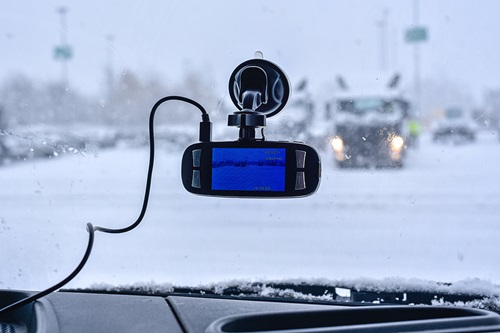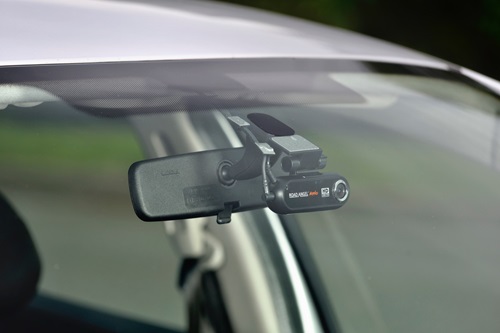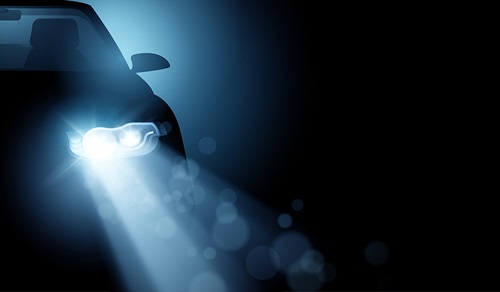It’s best to think of a dash-cam as your literal last line of defence. If all of your careful driving, your car’s safety systems, and plain old luck runs out and you’re involved in an accident that wasn’t your fault, the footage from a dash-cam can provide valuable proof of your innocence. (Conversely, the footage from your dash-cam can also be summonsed by the Gardai or the courts in the event that an accident was your fault, so do be aware of the double-edged sword effect there). But which dash-cam is the best?

Dash-cams are pretty simple devices — they’re a digital camera that records onto a built-in hard-drive or SD card which you stick to your windscreen (and to your rear screen as well if you want all-round protection) and which look out at and record the view from your car. Most of them automatically record for up to 30 minutes, constantly over-writing what’s gone before. The trick is that in the event of a crash, the last few moments before and during that incident will be captured. To save the data and the footage, in most cases, you simply switch the camera off and take out the hard-drive or card.
Increasingly, car companies are starting to offer built-in dash-cams, using the forward-facing cameras mounted in a car’s windscreen which previously have been entirely focused on monitoring the road in front of your car for unexpected obstacles. Others, such as Skoda, include handy USB sockets mounted in the rear-view mirror so that you can keep your dash-cam plugged in and not worry about the battery running out.
Which one is best, though?
Nextbase is a company which has quickly risen to the top of the dash-cam charts, and its products have become highly regarded. Prices range from as little as €79 to as much as €600 depending on where you’re shopping and what features you’d like to have. The top-spec models come with built-in GPS to geo-locate any footage recorded, and an accelerometer which can measure the force of any impact. There’s even a model with built-in Amazon Alexa voice control, while many models will connect to your phone via 4G and 5G to allow you to use the camera to monitor your car when it’s parked away from you. If you don’t want to spend top-dollar, there is a Nextbase 222 model which has a 140-degree lens view, an accelerometer, and an auto-on feature which costs just €90. That’s as good a starter dash-cam as you’re likely to find.

Garmin, better known perhaps for its smart-watches and navigation systems, is a more recognised name in the dash-cam game. Its models generally aren’t as affordable as the most basic Nextgear cams, but they also don’t become as expensive at the higher end. Figure on spending between €149 and €209 depending on the shop and the model. The best all-round value for a Garmin dash-cam is probably the 66W Full-HD model which comes with a 180-degree wide-angle lens, an accelerometer, a wifi connection, voice control, and the ability to stake still photos if something catches your interest. That costs around €199, depending on the retailer.
Road Angel became famous in the 1990s for its speed camera and radar detection systems (even if they were of dubious legality) but with its dash-cams, the company is on firmer legal ground. It’s units are arguably the most stylish dash-cams to look at, if that’s something that’s important to you, and they of course come with many of the same features as the rivals from Garmin and Nextbase. There’s a model — the Halo View 2K — which clips onto your rear-view mirror and includes both a wide-angle 140-degree forward facing camera, and a rear-view camera too so that there’s no need to fit a second camera in the back of the car. It costs around €250 and is a good choice for those who want all-round protection. Alternatively, there’s a Hal Go Full HD model which has all the expected features — 140-degree lens, accelerometer, wifi — but which costs a more reasonable €120 and which has a cool barrel-shaped body.
Want something more reasonably priced?
Check out a RoadHawk HD camera. It’s a slim, basic unit and costs as little as €50, but it does come with a high-resolution 1080p camera. If you fancy splashing out a little more, consider a BlackVue DR900S, which costs a chunky €300, but which does come with 4K resolution and a wide-angle 162-degree lens.
Dash-Cam FAQs:
Can dash-cams see at night?

Yes. There aren’t many cams with actual night-vision but they all come with lenses and sensors tuned to work in low-light conditions, and of course a forward-facing camera will be able to see the same as you at night, thanks to your car’s headlights.
Do dash-cams have a ‘sentry mode’?
Some do, indeed. This means that the camera can connect either to wifi or a mobile phone network, and you can remotely switch them on and use them as a remote camera to monitor your car or the area around it. Some will automatically respond to a parking ding, and switch on to record the details of the car which struck yours while it was parked.
Can you get a wired-in dash-cam?
Yes. As mentioned above, many car makers now offer a built-in dash-cam as part of the car’s original equipment. Brands from BMW to Citroen offer this, so check the options list when buying a new car if it’s something you want. A fully-wired-in dash-cam can be fitted to an existing car, and those can be fitted by independent garages or even parts suppliers such as Halfords.
So there you have it, a round-up of the best dash-cams available today. Let us know if we've missed any!